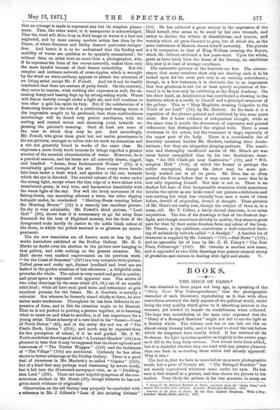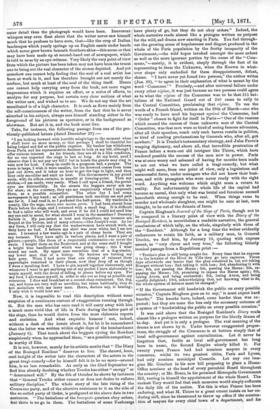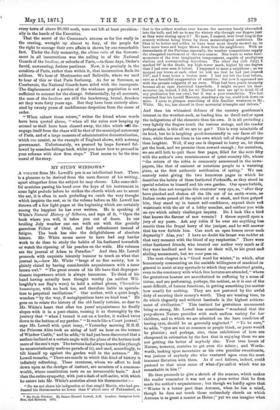BOOKS.
THE SIEGE OF PARIS.* It was observed in these pages not long ago, in speaking of the "Daily News War Correspondence," that the photographic character of such literature, reproducing as it does with often marvellous accuracy the daily aspects of the political world, whilst being the very quality which gives to it absorbing interest at the moment, yet tended to impair its readableness when collected. The hope was nevertheless at the same time expressed that the "Diary of a Besieged Resident" might not fail to see the light as a literary whole. The volume now lies or has lain ere this on almost every literary table, and it is found to stand the test before which its congeners have mostly failed. It has retained all its freshness. Its light cynicism sparkles as brightly in the octavo page as it did in the long daily column. New letters have been added, but it is doubtful whether they are read with any greater pleasure than one feels in re-reading those which had already appeared. Why is this ?
'The fact is, that we have no more before us, a mere photographin result, but a piece of literary art. "The Besieged Resident" has not merely reproduced whatever came under his eyes. He has seen it first himself as a picture, and then shown the picture to his readers. Very likely the picture is far less accurate in many an • Diary of the 13esteged Retident in Pare. reprinted from the "Daily News," with several New Letters and a Preface. London : Hurst and Machete. 1871.
Journal of the Siege of Parts. By the Hon. Captain Bingham. With a Map. London: Smith, Elder, and Co. 1871.
outer detail than the photograph would have been. Irreverent whispers may even float about that the writer never saw himself much that he profeses to have seen, that—like the crop of Italian landscapes which yearly springs up on English easels under bands which never grew brown beneath Southern skies—this scene or that may have been made up at second-hand out of newspapers, which is told to us as by an eye-witness. Very likely the very point of view from which the picture has been taken may not have been the truest one to bring out the real character of the scenes depicted. And yet somehow one cannot help feeling that the soul of a real artist has been at work in it, and has therefore brought out not merely the surface, but much at least of the soul of the thing itself. Hence one cannot help carrying away from the book, not mere vague impressions which it requires an effort, or a series of efforts, to analyze for any purpose, but certain very clear notions of what the writer saw, and wished us to see. We do not say that the art manifested is of a high character. It is such as flows mainly from the self-consciousness of the writer, from the fact that he is never absorbed in his subject, always sees himself standing either in the foreground of his pictures as spectator, or in the background as showman. But art it is, and the book must live.
Take, for instance, the following passage from one of the pre- ciously-published letters (dated December 29) :—
"I am looking forward with horrible misgivings to the moment when I shall have no more money, so that perhaps I shall be thankful for being lodged and fed at the public expense. My banker has withdrawn from Paris, and his representative declines to look at my bill, although I offer ruinous interest. As for friends, they are all in a like condition, for no one expected the siege to last so long. At my hotel, need I observe that I do not pay my bill ? but in hotels the guests may ring in vain now for food. I sleep on credit in a gorgeous bed, a pauper. The room is large, I wish it were smaller, for the firewood comes from trees just cut down, and it takes an hour to get the logs to light, and then they only smoulder and emit no heat. The thermometer in my grand room, with its silken curtains, is usually at freezing-point. Then my 'clothes,—I am seedy, very seedy. When I call upon a friend, the porter eyes me distrustfully. In the streets the beggars never ask me for alms; on the contrary, they eye me suspiciously when I approach them, as a possible competitor. The other day I had some mewspapers in my hand ; an old gentleman took one from me and paid me for it. I had read it, so I pocketed the half-pence. My wardrobe is scanty, like the sage, omnia men mecum polio. I had been absent from Paris before the siege, and I returned with a small bag. It is difficult to find a tailor who will work, and even if he did I could not send him my one suit to mend, for what should I wear in the meantime ? Decency forbids it. My pea-jacket is torn and threadbare, my trousers are frayed at the bottom, and of many colours,—like Joseph's coat. As for my linen, I will only say that the washerwomen have struck work, as they have no fuel. I believe my shirt was once white, but I am not sure. I invested a few weeks ago in a pair of cheap boots. They are my torment. They have split in various places, and I wear a pair of gaiters,—purple, like those of a respectable ecclesiastic—to cover the rents. I bought them on the Boulevard, and at the same stall I bought a bright blue handkerchief which was going cheep; this I wear round my neck. My upper man resembles that of a dog-stealer, any lower man that of a bishop. My buttons are turning my hair grey. When I had more than one change of raiment these appendages remained in their places, now they drop off as though I were a moulting fowl. I have to pin myself together elaborately, and 'whenever I want to get anything out of my pocket I have elaborately to unpin myself, with the dread of falling to pieces before my eyes. For my food, I allowance myself, in order to eke out as long as possible my resources. I dine and breakfast at a second-class restaurant. Cat, dog, rat, and horse are very well as novelties, but taken habitually, they do mot assimilate with my inner man. Horse, doctors say, is heating ; only wish it would heat me." . . . .
Now, it is impossible to read this description without some suspicion of a continuous current of exaggeration running through it. But the man who has once read it will carry away with him a much more vivid idea of life in Paris during the latter part of the siege, than he would derive from the most elaborate reports and statistics. And what exquisite humour ! not, indeed, without a dash of the heroic about it, for let it be remembered that the letter was written within eight days of the bombardment (January 6). That touch about the beggars eyeing the Resident suspiciously when he approached them, "as a possible competitor," is worthy of Elia.
It is not, however, merely for its artistic merits that" The Diary of the Besieged Resident" deserves to live. The shrewd, keen, tool insight of the writer into the characters of the actors in the great tragi-comedy—for he himself felt it to be no more—around him, is no less remarkable. As early as the 22nd September we find him already doubting whether Trochu has either " energy" or
4' determined will." By the 6th of October he shows by instances that " General Trochu either cannot or does not desire to enforce
military discipline." The whole story of the late rising of the 'Commune party, and of the abortive resistance to it on the side of the so-called party of Order, is prefigured at the above date in two sentences. "The battalions of the bourgeois quarters obey orders, but there is no go in them. The battalions of some Faubottrgs have plenty of go, but they do not obey orders." Indeed, the whole narrative reads almost like a prologue written on purpose for the wild, sad drama now enacting in Paris. You feel through- out the growing sense of hopelessness and disgust produced in the whole of the Paris population by the frothy incapacity of the Government,—the wild hopes invoked amongst the more ardent as well as the more ignorant portion by the, name of the " Corn- mune,"—mainly, it is evident, simply through the fact of its representing to them the Unknown, when the Known in what- ever shape only embodied for them disappointment, defeat, shame. "I have never yet found two persons," the author writes (Jan. 28), "to agree in their explanation of what is meant by the word 'Commune.'" Precisely,—and after universal failare under every other regime, it was just because no two persons could agree as to what the regime of the Commune was to be that 215 bat- talions of the National Guard out of 240 came to rally to the Central Committee, proclaiming that rigime. To use the words of a French friend, written on the 28th of March—one who was ready to have used his bayonet against the Commune, had " Order " chosen to fight for itself in Paris—" One of the reasons which caused the success of these unknown men of the Central Committee, was that men were so tired of seeing famous advocates, after all their speeches, reach only such barren results in politics, so tired of reading proclamations by Generals who, after all, got nowhere." It is Trochu's testamentary strategy, and Jules Favre's weeping diplomacy, and above all, that incredible prostration of France before a worn-out old intriguer like Thiers, which have rendered possible the success of the men now in power. Paris was at once weary and ashamed of having for months been made to act out what we have called a tragi-comedy, but what might well seem, from one point of view, only a lugubrious and unsuccessful farce, under managers who did not know their bu.si- ness, and with prompters who were never ready with the right word. Anything was welcome which might seem a return to reality. But unfortunately the whole life of the capital had become so unreal, that only what was brutal and ferocious seemed henceforth strong enough to be real. When things came to murder and wholesale slaughter, one might be sure at last, men thought, to be out of the domain of farce.
Captain Bingham's Journal of the Siege of Paris, though not to be compared in a literary point of view with the Diary of the Besieged Resident, is nevertheless a readable narrative, the general conclusions of which tally, on the whole, singularly with those of the "Resident." Although for a long time the writer evidently endeavours to retain his faith, as a military man, in General Trochu, we find him, by January 10, quoting with express assent, as "very clever and very true," the following bitterly ironical passage from a Republican print :—
" Trochu's plan is still being sought for. Every time that he exposes it to the lawyers of the Hotel do Ville they go into raptures. Three days afterwards one learns that the plan consisted in, 1st, not taking Bourget without loss ; 2nd, taking it with loss ; 3rd, abandoning it with loss; 4th, not passing the Marne ; 5th, passing the Marne; 6th, re- passing the Marne; 7th, promising to repass the Marne again ; 8th, taking Avron, and being enchanted ; 9th, losing Avron, and being equally delighted; 10th, acknowledging that, not knowing what to do, the whole system of defence must be changed."
"If the Government will hoodwink the public on every possible occasion," Captain Bingham goes on to say," it must expect hard knocks." The knocks have, indeed, come harder than was ex- pected; but they are none the less only the necessary outcome of a system of "hoodwinking the public on every possible occasion."
It was said above that the Besieged Resident's Diary reads almost like a prologue written on purpose for the bloody drama of to-day. And yet it is only a prologue. The real meaning of the drama is not shown by it. Under however exaggerated propor- tions, the struggle of the Commune is at bottom simply that of local self-government against centralization. Let it never be forgotten that, feeble as local self-government has long been in name, the Second Empire utterly killed it. For twenty years France had had nominee mayors in every commune, whilst its two greatest cities, Paris and Lyons, had only nominee municipal Councils. Let any one ima- gine Mr. Goschen in his new bill proposing to place a Home- Office nominee at the head of every parochial Board throughout the country; or Mr. Bruce, in his promised Metropolis Government Bill, vesting in himself the appointment of the whole Board. The rankest Tory would feel that such measures would simply suffocate the daily life of the nation. Yet this is what France has been enduring, and what M. Thiers to a great extent insists on her en- during still, since he threatened to throw up office if the nomina- tion of mayors for every chief town of a department, and for every town of above 20,000 souls, were not left at least provision- ally in the hands of the Executive.
That the secret of the Commune's success so far lies really in the craving, wrought up almost to fury, of the people for the right to manage their own affairs is shown by one remarkable fact. Under the July monarchy, the ultima ratio of the Govern- ment in all insurrections was the calling in of the National Guards of the banlieue, or suburbs of Paris,—in those days, Order's fervid, unwavering, furious partizans. Now, it is precisely in the outskirts of Paris, rather than within it, that insurrection finds its soldiers. We hear of Montmartre and Belleville, where we used to hear of this or that Paris faubourg. As far as Suresnes, as Courbevoie, the National Guards have sided with the insurgents. The displacement of a portion of the workman population is not sufficient to account for the change. Substantially, by all accounts, the men of the banlieue are still the headstrong, brutal, drunken set they were forty years ago. But they have been entirely alien- ated by twenty years of meddlesome despotism from the cause of order.
"When calmer time; return," writes the friend whose words have been quoted above, "when all the ruins now heaping up
around us shall have been cleared away, the idea which 1 dis- engage itself from the chaos will be that of the municipal autonomy of Paris, and of a large measure of administrative decentralization, which can consist, as the example of England shows, with a strong government. Unfortunately, we proceed by leaps forward fol- lowed by senseless fallings back, whilst you know how to proceed in your reforms with slow firm steps." That seems to be the true moral of the story.




































 Previous page
Previous page